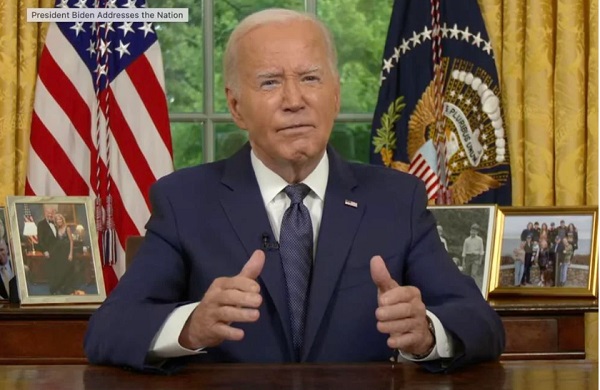International
Out soon? Biden faces growing calls to withdraw 2024 White House bid

From The Center Square
By
President Joe Biden faces a growing tidal wave of opposition and calls for him to leave the presidential race from his own party, with more elected Democrats coming out against him seemingly every day.
Meanwhile, unconfirmed media reports from multiple outlets have suggested Biden is considering bowing out of the race and could make the announcement in the coming days.
Despite those reports, Biden’s campaign released a statement Friday saying that the president will resume campaigning next week.
U.S. Sen. Martin Heinrich, D-N.M., released a statement on Friday calling for Biden to step aside so that another Democrat can take on former President Donald Trump in November.
Heinrich is the third elected senator to do so, joining dozens of House Democrats and other party leaders. This kind of revolt within the party is highly unusual, though Biden does have publicly voiced support from about 75 Democrats, according to a tally from the New York Times.
Most Democrats questioning Biden have made a similar argument: Biden has a great legacy, but he probably can’t beat Trump in November.
A leading Democrat in the House, U.S. Rep. Adam Schiff of California, made that argument earlier this week when he called on Biden to step aside.
“A second Trump presidency will undermine the very foundation of our democracy, and I have serious concerns about whether the President can defeat Donald Trump in November,” Schiff said.
Freshly certified Vice Presidential candidate J.D. Vance took a shot at Biden on Friday, questioning his cognitive decline and questioning if Biden should leave the White House altogether.
“If Joe Biden doesn’t have the cognitive function to run for re-election, then he certainly doesn’t have the cognitive function to remain as Commander-In-Chief,” Vance wrote on X, formerly known as Twitter. “How can any Dem pushing him to drop out of the presidential race, argue in good faith that he should stay on as POTUS?”
Biden’s woes gained steam after his disastrous debate performance at the end of last month put his campaign on defense as traditionally liberal media questioned his fitness and Democrats began calling for him to leave the race.
Trump narrowly survived an assassination attempt last weekend, further rallying his base and making him more sympathetic to Independents. Even before the assassination attempt, Trump led Biden nationally in polling and in nearly every key battleground state.
Biden has so far publicly insisted he will remain the party’s nominee. Since the assassination attempt and Biden began quarantining for his COVID-19 infection, the pressure has ramped up even more.
If Biden does drop out, a key question will be whether he decides to endorse Vice President Kamala Harris or to leave the Democratic National Convention in August open for other likely contenders, such Michigan Gov. Gretchen Whitmer, California Gov. Gavin Newsom or others to make a play for the nomination.
Meanwhile, Republicans and Trump’s fiercest supporters have been propelled by Trump’s wins, his attempted assassination survival, and seem more confident than ever about November.
“The Democrat party is in more chaos than ever,” U.S. Rep. Marjorie Taylor Greene, R-Ga., wrote on X, formerly known as Twitter. “While they try to force out a feeble old man who refuses to give up the wheel, they remain unified on disastrous policies that have ravaged our country. Will Biden drop out? Maybe.
“Will it matter? No.
“The American people need Donald Trump, and in November, we’re sending him back to the White House,” she added.
International
Trump puts new price tag on Canada joining “Golden Dome”

Quick Hit:
President Trump has upped the cost for Canada to join the U.S. “Golden Dome” missile defense program to $71 billion—$10 billion more than his previous ask.
Key Details:
- Trump confirmed the new $71 billion figure while speaking to reporters aboard Air Force One.
- Canada has pushed back, with PM Mark Carney and diplomats calling Trump’s offer a “protection racket.”
- Trump said Canada could access the system for free if it became the 51st U.S. state.
Diving Deeper:
President Trump has put a new and steeper price on Canada’s potential entry into America’s “Golden Dome” missile defense program. Speaking from Air Force One on Monday, Trump told reporters, “They want to be in… Seventy-one billion they’re going to pay.”
That’s a $10 billion increase from the $61 billion figure Trump had previously floated, marking a sharp escalation in his negotiations with Ottawa. The Golden Dome, described by the administration as a “state-of-the-art” defense shield, aims to protect North America from a new era of missile threats—particularly those posed by China, Russia, and North Korea.
Trump has framed the Golden Dome as the long-awaited realization of Ronald Reagan’s “Star Wars” vision, using space-based sensors and interceptors to strike down incoming ballistic, cruise, or hypersonic missiles. Development timelines suggest full deployment is still 5–7 years off, but an initial $25 billion is already allocated in next year’s defense budget. The entire project may run upwards of $175 billion, with some estimates as high as $542 billion over 20 years.
Canada, which has long partnered with the U.S. under NORAD to detect airborne threats, has expressed interest in joining the project. But Trump is demanding a separate, costly buy-in. He reiterated that Ottawa would “have to pay a lot of money” to participate unless it pursued a full political union with the U.S. “It would be free if Canada became the 51st state,” he added.
Canadian leaders have pushed back hard. Prime Minister Mark Carney, re-elected in April after campaigning against U.S. interference, said Canada wants to protect its citizens but not under terms dictated from Washington. Ambassador to the U.N. Bob Rae went further, calling Trump’s offer a “protection racket.”
conflict
Trump dismisses US intelligence that Iran wasn’t pursuing nuclear bomb before Israeli attack

From LifeSiteNews
By Dave DeCamp
When asked about Tulsi Gabbard’s assessment, President Trump said, ‘I don’t care what she said. I think they’re very close to having [a nuclear weapon].’
Ahead of Israel’s attacks on Iran, U.S. intelligence assessed that Iran was not pursuing nuclear weapons and that even if it chose to do so, it would take up to three years for Tehran to be able to produce and deliver a nuclear bomb against a target of its choosing, CNN reported on Tuesday, citing people familiar with the intelligence.
The U.S. assessment goes against the claims from Israeli Prime Minister Benjamin Netanyahu, who launched the war under the pretext of preventing Iran from obtaining a nuclear weapon. But President Trump appears to be taking Israel’s word over his own intelligence agencies, as he told reporters that he didn’t care about his director of national intelligence’s assessment on the issue.
In March, DNI Tulsi Gabbard said that “Iran is not building a nuclear weapon and Supreme Leader Khamenei has not authorized the nuclear weapons program he suspended in 2003.” Her assessment was reflected in the Intelligence Community’s annual threat assessment.
When asked about this assessment, President Trump said, “I don’t care what she said. I think they’re very close to having [a nuclear weapon].”
Netanyahu claimed in an interview on Sunday that he shared intelligence with the U.S. that Iran could have developed a nuclear weapon within months or a year, although that was not the conclusion of U.S. intelligence agencies, based on the CNN report. But even based on Netanyahu’s own timeline, the U.S. would have had time to continue negotiations with Iran.
Israel attacked Iran two days before another round of negotiations between the U.S. and Iran was set to be held. Trump had been demanding that Iran eliminate its nuclear enrichment program, which was a non-starter for Tehran. Despite the apparent impasse, Iran was set to present a counter-proposal to the U.S., but the talks were canceled after Israel launched its war.
Reprinted with permission from Antiwar.com.
-

 Alberta1 day ago
Alberta1 day agoAlberta health care blockbuster: Province eliminating AHS Health Zones in favour of local decision-making!
-

 Crime2 days ago
Crime2 days agoUK finally admits clear evidence linking Pakistanis and child grooming gangs
-

 conflict1 day ago
conflict1 day agoTrump: ‘We’ have control over Iranian airspace; know where Khomeini is hiding
-

 Alberta15 hours ago
Alberta15 hours agoAlberta pro-life group says health officials admit many babies are left to die after failed abortions
-

 Daily Caller15 hours ago
Daily Caller15 hours ago‘Not Held Hostage Anymore’: Economist Explains How America Benefits If Trump Gets Oil And Gas Expansion
-

 Business2 days ago
Business2 days agoCarney praises Trump’s world ‘leadership’ at G7 meeting in Canada
-

 Alberta15 hours ago
Alberta15 hours agoCentral Alberta MP resigns to give Conservative leader Pierre Poilievre a chance to regain a seat in Parliament
-

 conflict2 days ago
conflict2 days agoIsrael bombs Iranian state TV while live on air


